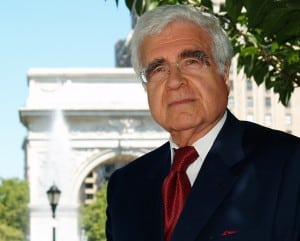 Every year, the University of Louisville Brandeis School of Law honors a leader in the legal profession with the Brandeis Medal and invites the honoree to Louisville to make a speech. That individual’s work exemplifies the values espoused by the school’s namesake, Justice Louis D. Brandeis.
Every year, the University of Louisville Brandeis School of Law honors a leader in the legal profession with the Brandeis Medal and invites the honoree to Louisville to make a speech. That individual’s work exemplifies the values espoused by the school’s namesake, Justice Louis D. Brandeis.
This year’s honoree, New York University Law School Professor Arthur Miller, is known for his work in civil procedure, privacy and other issues for which Justice Brandeis was an advocate, but he is also known for hosting and facilitating public debates on current ethical issues.
Law School Dean Susan Duncan welcomed everyone and recognized the members of the Brandeis Society who were present at the event and Professor Laura Rothstein introduced Miller and the format for the evening’s program.
This style of debate was co-created by Fred Friendly and Edward R. Murrow, and Miller was a frequent host on the PBS series. To further honor Miller and the art form he helped shape, this year’s presentation was a Fred Friendly-style debate.
The panelists included Betty Bayé, whose 27-year career with The Courier-Journal is best remembered for op-ed pieces on race, politics and social justice interspersed with personal stories and insights on African-American history; Hon. Denise Clayton, the first black woman to serve on the Kentucky Court of Appeals; Greg Haynes, a lawyer with Wyatt Tarrant & Combs whose practice focuses on commercial and business litigation; David Jones Jr., president of the Jefferson County School Board and founder of Chrysalis Ventures; and Bill Stone, president of Louisville Plate Glass Co., and a regular participant in civic matters.
Miller, an accomplished artist in this style of presentation, emceed the debate, starting by posing a hypothetical situation. Mr. Goodheart and his family, wonderful people and professionals have moved to our community and Mr. Goodheart is one of the greatest little league coaches in the region. In this day and age of concern for the safety of children, a demand has been made that all little league coaches be fingerprinted.
Judge Clayton said it was unreasonable and irrational, and Stone declared it to be ludicrous. Haynes observed that it is likely that all of us have a file on us somewhere, and Bayé pointed out that in these litigious times, in the wake of the scandals involving priests, schools and institutions are just trying to protect themselves. Jones declared fingerprinting is irrelevant. “We can use our social media savvy and other available data” to determine if an individual is a risk, he said.
As discussion continued, Miller suggested that maybe fingerprinting wouldn’t be enough – what about getting DNA samples, and Stone raised the ante jesting that perhaps people should get identification chips like dogs. Jones pointed out that we already carry the chip with our cell phones.
Bayé got to the root of the dilemma: we want the government to protect us, but how much government monitoring do we want? Drug tests for welfare mothers? How about for immigrants? And Judge Clayton pointed out that the government already collects a lot of data and doesn’t know how to use it effectively.
This led into a discussion of data bases, surveillance and profiling.
When profiling came up, Miller reset the underlying scenario, telling panelists you are now the trustees of a university and are worried about the students’ safety. There is a proposal to issue ever student an ID with a chip that will allow the administration to monitor where a student is and what his/her alcohol and drug levels are.
Again, the panelists, egged on by Miller’s often provocative interjections considered the pros and cons of good intentions with unintended consequences and the ramifications of too much coddling even if done with the students’ best interests in mind.
There was an acknowledgement that the ability to collect all kinds of information on people already exists and defining the limits between limiting risk and honoring privacy, if privacy even exists at all today, is a very difficult task.
Again Miller reset the scenario, telling the panelists that they are judges and jurors and someone has developed a complex program and website called celebrity and neighbor stalker. For a $50 fee, anyone can sign up to spy on anyone else, and 10,000 people signed up.
Someone who is being stalked reports it to the police, and the police can’t do anything about it. The stalker broke into the victim’s house and still no help. Only after the stalker attacks the victim is the perpetrator caught. Now the victim isn’t interested in the stalker. The victim wants the website shut down.
The discussion focused on prior restraint versus suing for damages with a realization that this is an international issue and different countries will deal with the issue differently.
When Miller brought the discussions to an end, Dean Duncan formally presented him with the Brandeis Medal.


